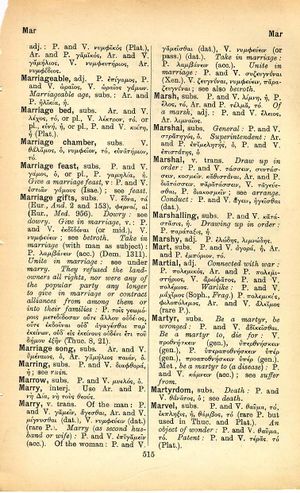marry: Difference between revisions
From LSJ
ἐφ' ἁρμαμαξῶν μαλθακῶς κατακείμενοι → reclining softly on litters, reclining luxuriously in covered carriages
m (Woodhouse1 replacement) |
mNo edit summary |
||
| Line 3: | Line 3: | ||
===interjection=== | ===interjection=== | ||
Use [[Aristophanes|Ar.]] and [[prose|P.]] | Use [[Aristophanes|Ar.]] and [[prose|P.]] [[νὴ Δία]], [[νὴ τοὺς θεούς]]. | ||
===verb transitive=== | ===verb transitive=== | ||
| Line 9: | Line 9: | ||
Of the man: [[prose|P.]] and [[verse|V.]] [[γαμεῖν]], [[ἄγεσθαι]], [[Aristophanes|Ar.]] and [[verse|V.]] [[μίγνυσθαι]] (dat.), [[verse|V.]] [[νυμφεύειν]] (dat.) (rare [[prose|P.]]). | Of the man: [[prose|P.]] and [[verse|V.]] [[γαμεῖν]], [[ἄγεσθαι]], [[Aristophanes|Ar.]] and [[verse|V.]] [[μίγνυσθαι]] (dat.), [[verse|V.]] [[νυμφεύειν]] (dat.) (rare [[prose|P.]]). | ||
[[marry]] ([[ | [[marry]] (as [[second]] [[husband]] or [[wife]]): [[prose|P.]] and [[verse|V.]] [[ἐπιγαμεῖν]] (acc.). | ||
Of the woman: [[prose|P.]] and [[verse|V.]] [[γαμεῖσθαι]] (dat.), [[verse|V.]] [[νυμφεύειν]] (or pass.) (dat.). | Of the woman: [[prose|P.]] and [[verse|V.]] [[γαμεῖσθαι]] (dat.), [[verse|V.]] [[νυμφεύειν]] (or pass.) (dat.). | ||
Revision as of 14:18, 28 June 2020
English > Greek (Woodhouse)
interjection
Use Ar. and P. νὴ Δία, νὴ τοὺς θεούς.
verb transitive
Of the man: P. and V. γαμεῖν, ἄγεσθαι, Ar. and V. μίγνυσθαι (dat.), V. νυμφεύειν (dat.) (rare P.).
marry (as second husband or wife): P. and V. ἐπιγαμεῖν (acc.).
Of the woman: P. and V. γαμεῖσθαι (dat.), V. νυμφεύειν (or pass.) (dat.).
take in marriage: P. λαμβάνω, λαμβάνειν (acc.).
unite in marriage: P. and V. συζευγνύναι (Xen.). V. ζευγνύναι, νυμφεύειν, παραζευγνύναι; see also betroth.

